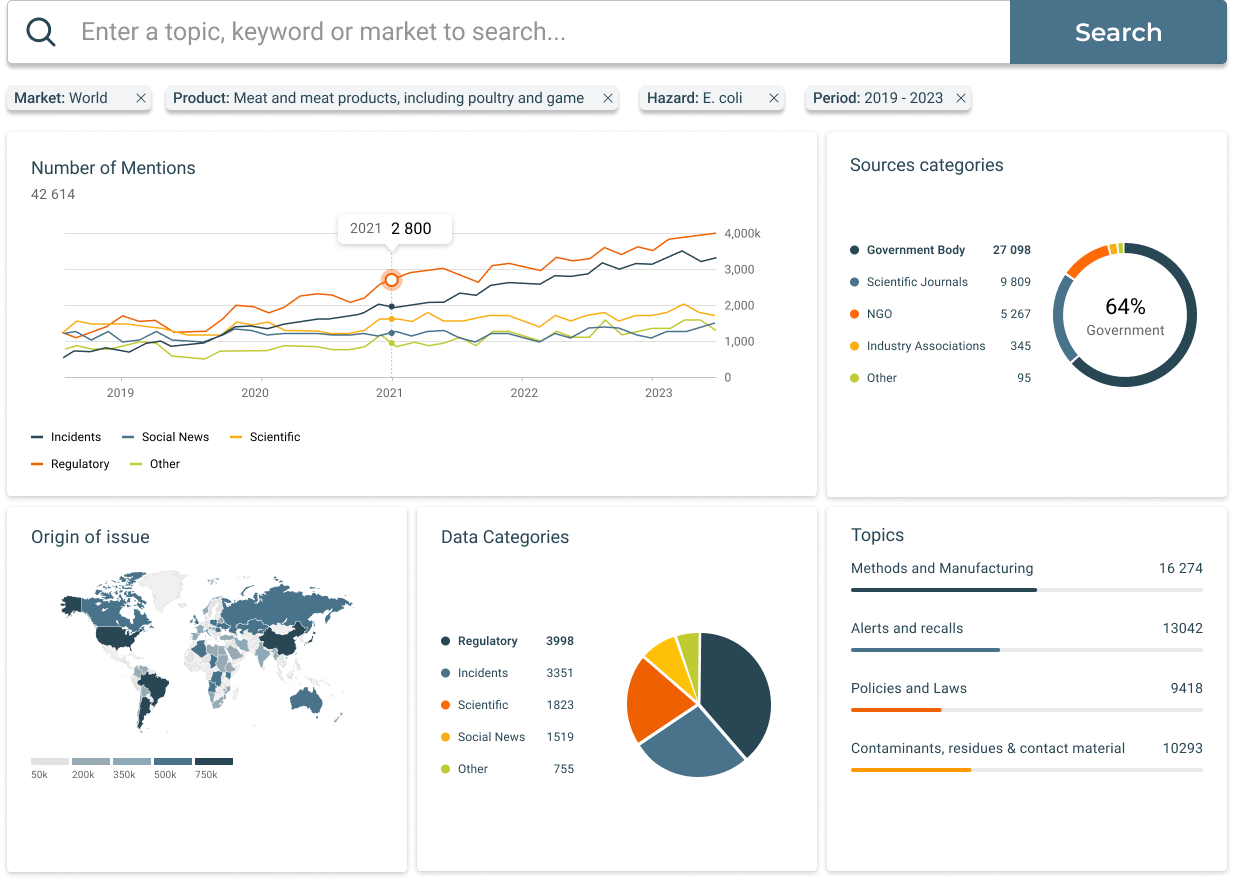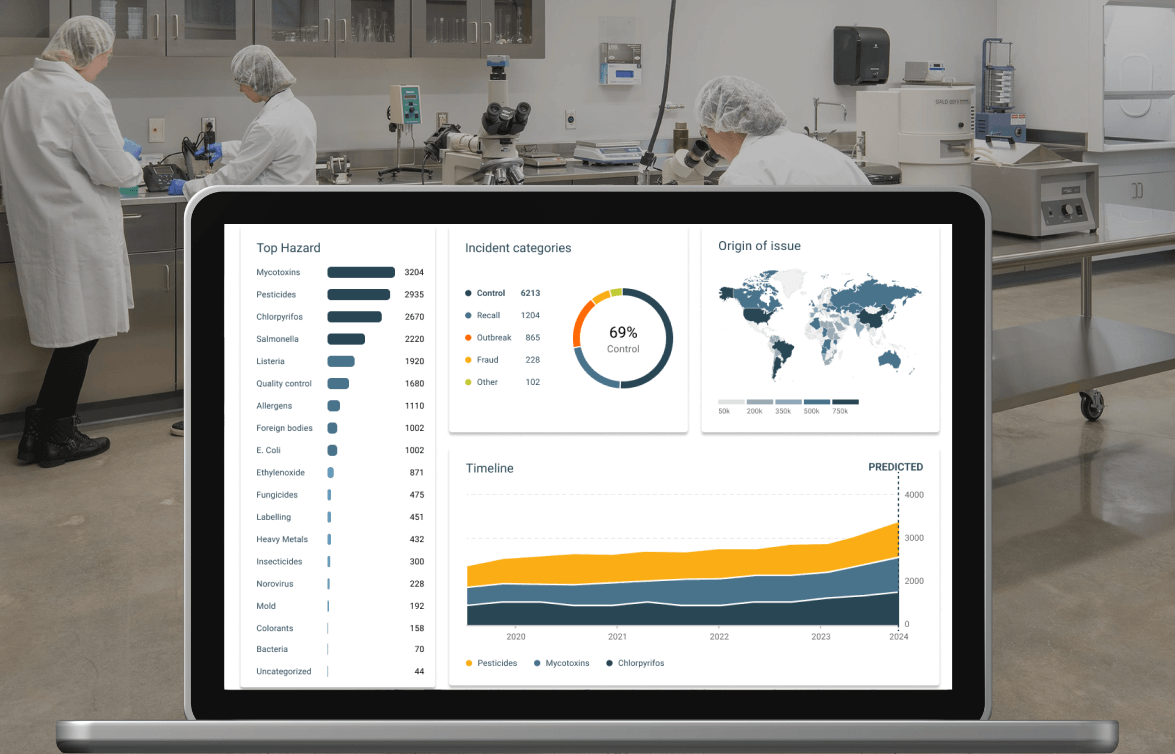The right Food Safety Management Software can go a long way toward assuring food product safety and quality. With food safety getting more complicated, requiring real-time monitoring, robust FSMS will help businesses stay compliant to protect public health. This guide walks you through what to look for in a solution and key considerations when choosing the best FSMS for your organization.
What is Food Safety Management Software
Food Safety Management Software aids food businesses in compliance with food safety regulations to ensure high standards of hygiene and quality control. The tool integrates digital monitoring, reporting, risk management, and compliance tracking to help gain assurance that your food products are safe for consumption. FSMS empowers organizations to automate all documentation, trace critical control points, and makes real-time data insights available to establish a legitimate foundation for identifying possible hazards that can prevent illness caused by food and ensure a product complies with all of the regulatory standards. Thus, FSMS improves efficiency, reduces non-compliance risks, and safeguards the brand reputation of an organization.
Key Features to Look for in Food Safety Management Software
Comprehensive Compliance Management
Any good FSMS should be able to give compliance management capabilities across multiple jurisdictions. These could be in the form of a global regulation repository, real-time regulatory updates, compliance document management, and so on. Ensuring that your software is able to cope with the intricacies of international regulations is key to ensuring smooth operations all around the world.
Risk Assessment and Management
Risk management is one of the backbones of food safety. The best FSMS should offer strong, dependable hazard analysis and risk assessment tools and provide real-time monitoring of potential threats. Look for features that enable predictive risk management and automate alerts to help you get ahead of problems before they develop.
Ingredient Monitoring
Ingredient compliance impacts food safety. Your FSMS should enable you to trace legal limits on residues, additives, and banned substances. It shall also trigger an alert in case of any changes in the rules related to ingredients and maintain a compliance information database that is updated continuously.
Automated Compliance Workflows
It can also vastly improve the efficiency and accuracy of compliance management. The FSMS should provide automated workflows for regulatory standard checks on formulations, label content creation, and verification for its smooth market entry. This will reduce manual errors and make processes smooth.
Advanced Data Analytics
Food safety process-related insights are realized through data analytics. Make sure that your chosen FSMS is enabled with advanced analytics—trend analysis, predictive modeling, comprehensive reporting—for making decisions based on data toward continual improvement in food safety practices.
Horizon Scanning and Early Warning Systems
Staying ahead of rising risks and trends is paramount to managing food safety proactively. The FSMS shall provide tools for horizon scanning, taking in data sources from all over the world on new threats, changes in regulations, and developments related to the industry. In this way, it will be easier for a firm to comprehend those potential risks and mitigate them before affecting the business.
User-Friendly Interface
A user-friendly interface is quite necessary to ensure that all members of the team get on board and work efficiently in the FSMS. It should be intuitive and easy to use, requiring little training. This can help enable the users to use the system in the best possible manner and harness its capabilities to the full.
The Role of AI in Modern Food Safety Management Software
Artificial intelligence optimizes food safety management by making the processes easier and facilitating better decision-making in human operators. Here's how AI contributes to this:
Streamlined Decision-Making
AI rapidly goes through heaps of data and comes out with actionable insights that enable managers to make informed decisions fast. This cuts down on the time and effort needed for analysis of data manually and enables a prompt response to any probable issues that may arise.
Automated Compliance
It automates the tracking of changes to regulations and updates compliance protocols. This reduces the potential for human error and lessens some of the burden on compliance teams, freeing them up to work on strategic issues.
Predictive Maintenance
AI uses machine learning on historical and real-time data to predict equipment failures before they happen. Proactively addressing this allows the process to avoid production disruption and assure continuous and efficient operations.
Enhanced Risk Management
AI identifies patterns and trends that may not be apparent through traditional analysis, enabling more effective risk management. By highlighting emerging risks, AI allows businesses to address potential hazards proactively, reducing the likelihood of food safety incidents.
Evaluating Food Safety Management Software Vendors
Reputation and Experience
The vendor should be selected based on sterling reputation and long years of experience in dealing with food safety matters. Customer reviews, case studies, or some other form of industry-recognized awards should be looked for in order to validate their credibility and performance record. A vendor with good repute will stand a better chance of delivering reliable software along with good customer support.
Customer Support
Successful implementation and running of FSMS requires reliable customer support. Ensure that they have efficient customer support options that will be able to help you out in times of need. Good customer support will thus expedite the resolution process, increasing benefits reaped from the software.
Training and Resources
Go for vendors that provide complete training and resources, including user manuals, video tutorials, webinars, and so much more educational material to help your team members avail of the software to its fullest potential. Proper training will let the team use the FSMS effectively and help them apply all the features therein
Pricing and Value for Money
While pricing is an important consideration, it shouldn’t be the sole deciding factor. Evaluate the features and benefits the software offers to ensure it provides good value for money. Look for flexible pricing plans that can accommodate your budget and business size.
Implementation Considerations
PLANNING AND PREPARATION
Firstly, make a needs assessment before the implementation of the FSMS and identify what your requirements are. Clearly state what your goals are, then draw up a detailed plan of implementation to ensure a smooth transition. Proper planning will ensure that the software suits your needs, besides integrating well with the current processes.
TRAIN YOUR TEAM
Proper training is much needed for the implementation of FSMS. Be sure to train your team properly on the features the software offers in order to maximize its benefits. Continual training and support keep your team updated on innovations and best practices.
CONTINUOUS IMPROVEMENT
Follow up regularly on the performance of your FSMS and evaluate its working. Take feedback from users to make adjustments for continuous improvement of food safety processes. This aids in keeping the FSMS effective and up-to-date with the changing regulations and current industry standards.
Conclusion
This means that when choosing the best food safety management software, a lot has to be considered, from features to vendor reputation to a proper implementation strategy. By following these steps, as described in this article, you will make an informed decision that will improve your food safety management and satisfy industry standards.
Enhancing Food Safety Management Software with AI
SGS Digicomply significantly enhances Food Safety Management Software (FSMS) by integrating advanced artificial intelligence (AI) into its food safety software.

This innovative approach automates data analysis, providing real-time insights and predictive analytics that improve decision-making and risk management. AI helps identify potential hazards early, ensuring swift corrective actions and maintaining compliance with regulatory standards. Additionally, it streamlines documentation and reporting processes, making it easier for organizations to manage their food safety protocols efficiently and effectively. Check out these demos to see it in action.





.webp?width=1644&height=1254&name=Food%20Safety%20Dashboard%201%20(1).webp)
